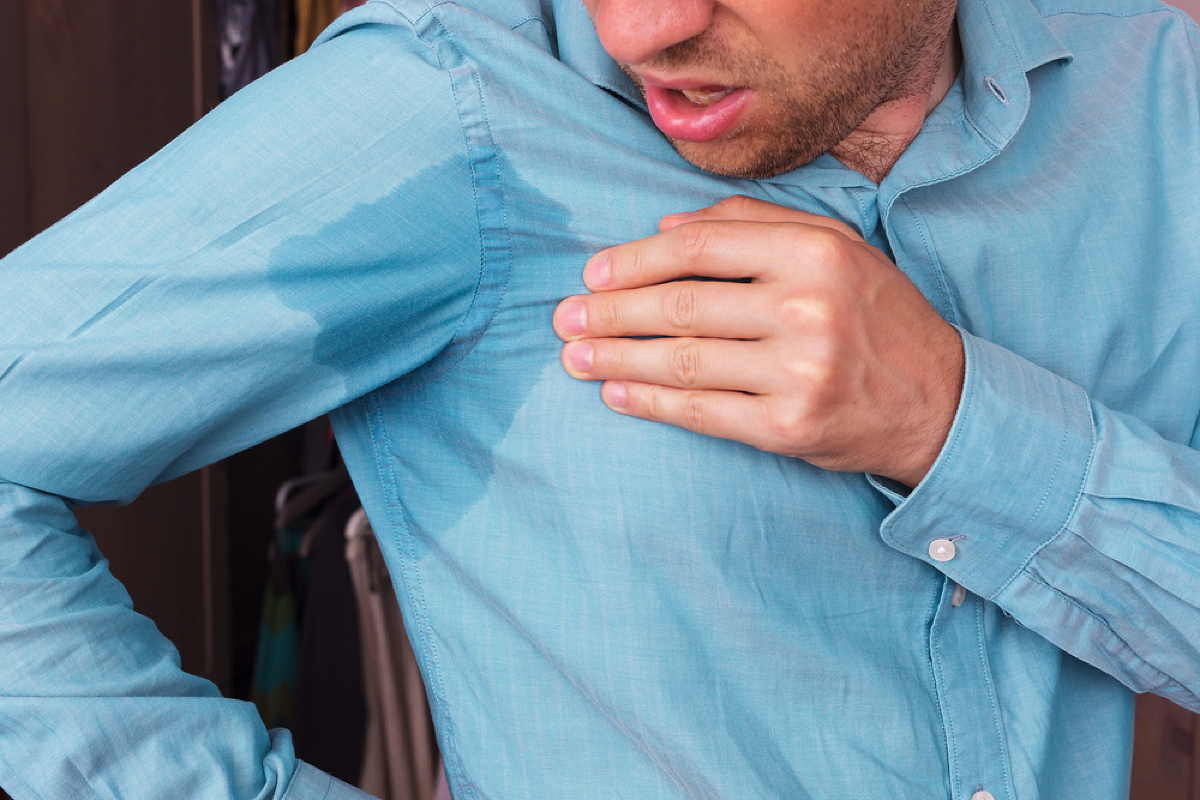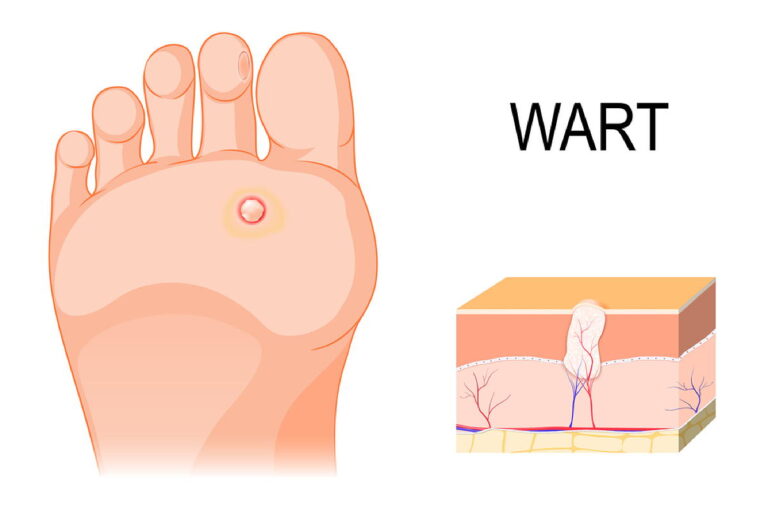What helps against sweating?
Beads of sweat on your forehead during a meeting or wet stains on your T-shirt – sweating is an everyday phenomenon that is completely normal in most cases.
However, if your body sweats excessively and sweat productionexceeds normal levels, this can become a real burden. Doctors refer to such cases as hyperhidrosis.
In this article, you will find out why we sweat at all, when it is normal and how you can get to grips with excessive sweating.
Why do we sweat at all?
It’s normal to sweat, but have you ever wondered why? Sweating is a natural process that occurs in many situations.
The natural function of sweating
Sweating helps to regulate your body temperature. When you exert yourself physically or are in the heat, your body produces sweat to cool you down.
When is sweating normal?
Sweating is completely normal and even healthy in many situations. It occurs during physical exertion, in the heat or during a cold. Emotional factors such as stress can also lead to increased sweating.
Here are some examples of when sweating is normal:
- During physical exertion
- In the heat
- During a cold
- For emotional stress
The amount of sweat varies from person to person. Some people generally sweat more than others, without this being pathological.
| Situations | Sweating behavior |
|---|---|
| Physical exertion | Heavy sweating |
| Heat | Heavy sweating |
| Emotional stress | Emotional sweating |
Recognizing excessive sweating
If you are sweating more than usual, it may be a sign of a certain health problem. Excessive sweating, also known as hyperhidrosis, is a condition that can severely affect your daily life.
It is important to recognize the signs so that appropriate measures can be taken.
The difference between normal and excessive sweating
We normally sweat to regulate our body temperature. Excessive sweating, on the other hand, occurs for no apparent reason and can be triggered by various factors.
While normal sweating is a natural reaction, heavy sweating can be an indication of an underlying condition.
Symptoms of hyperhidrosis
The symptoms of hyperhidrosis can vary depending on the degree of severity. With mild hyperhidrosis (grade I), you will notice a significant increase in skin moisture and patches of sweat around 5-10 cm in diameter.
With moderately severe hyperhidrosis (grade II), beads of sweat form and the sweat patches reach 10-20 cm in diameter. In severe hyperhidrosis (grade III), the sweat drips off and the patches are larger than 20 cm. Typical symptoms also include constantly clammy hands.
Causes of heavy sweating
Why do some people sweat excessively? The causes of excessive sweating are varied and can have both medical and everyday reasons.
Primary hyperhidrosis
Primary hyperhidrosis is a condition in which sweating is increased for no apparent reason. It often affects the hands, feet and armpits.
Secondary hyperhidrosis
Secondary hyperhidrosis occurs as a symptom of another illness or due to side effects of medication. In this case, sweating is a secondary symptom.
Triggers in everyday life
In addition to medical causes, there are numerous everyday factors that can increase your sweating. These include spicy foods, alcohol and nicotine, which affect the blood vessels and disrupt sweat regulation.
| Trigger | Effect |
|---|---|
| Hot dishes | Stimulates the nerves and promotes sweating |
| Alcohol and nicotine | Have a negative effect on the blood vessels |
| Stress and anxiety | Activate the sympathetic nervous system |
Different types of hyperhidrosis
Hyperhidrosis can occur in different forms that have different effects on the body. It is important to understand these differences in order to find the right treatment.
Focal hyperhidrosis
Focal hyperhidrosis affects certain parts of the body, such as the hands, feet or armpits. This form of hyperhidrosis can be very uncomfortable and severely affect everyday life.
Generalized hyperhidrosis
In contrast, generalized hyperhidrosis affects the entire body and leads to increased sweat production in all or many parts of the body at the same time.
– It occurs more frequently as secondary hyperhidrosis and can be an indication of an underlying disease.
– Typically, you also sweat heavily at night, which is less common in the focal form.
If you sweat excessively all over your body, especially if this occurs suddenly, you should consult a doctor to rule out possible underlying illnesses.
What helps against sweating: Medical treatments
If you suffer from heavy sweating, there are various medical treatments that can help you. These range from simple treatments to more complex medical interventions.
Antiperspirants with aluminum salts
One of the simplest and most effective methods against heavy sweating is the use of antiperspirants with aluminum salts. These products reduce sweat production by temporarily blocking the sweat glands.
Tap water iontophoresis
Tap water iontophoresis is a non-invasive treatment in which a weak electric current is passed through the skin to reduce the sweat glands. This method is particularly effective for hands and feet.
Treatment with botulinum toxin
Botulinum toxin injections can temporarily reduce heavy sweating by blocking the nerves that stimulate the sweat glands. This treatment is particularly popular for underarm sweating.
Surgical interventions
For very severe sweating that does not respond to other treatments, surgical procedures such as endoscopic thoracic sympathectomy (ETS) or the removal of sweat glands may be an option. These procedures often offer permanent results but are associated with possible side effects such as compensatory sweating.
Natural home remedies for excessive sweating
If you suffer from heavy sweating, there are some natural home remedies that can help you. These remedies can be a good alternative or supplement to medical treatments.
Sage tea and other herbs
Sage tea is known for its antiperspirant properties. You can drink sage tea or apply it as a compress to the affected areas. Other herbs such as chamomile and peppermint can also help to reduce sweating.
Baking soda and apple cider vinegar
Baking soda can help to regulate the pH value of the skin and thus reduce sweating. Apple cider vinegar has antibacterial properties that can reduce the smell of sweat. You can use baking soda as an antiperspirant or use apple cider vinegar in a foot bath.
Oak bark and walnut leaves
Oak bark contains tannins that can inhibit sweat production. Walnut leaves have a similar effect. You can make a tea from both or use them as a bath additive.
Fenugreek bath
Fenugreek also has a calming effect on the sweat glands. The seed has an antibacterial effect and thus reduces the smell of sweat. To make a fenugreek bath, add 12 heaped teaspoons to a liter of water, leave the mixture to stand for around 6 hours, boil briefly, leave to cool and pour the mixture into the bath water. A 15-minute bath in this solution can soothe your skin and reduce sweat production for a while.
- A fenugreek bath can provide relief from heavy sweating, as the seeds have an antibacterial effect and reduce the smell of sweat.
- Fenugreek also calms the overactive sweat glands and can therefore help to reduce sweat stains.
Adjust diet and lifestyle
Adjusting your lifestyle and diet can help to control heavy sweating. This includes various aspects that you can take into account in your everyday life.
Foods that promote sweating
Certain foods can promote sweating. These include spicy foods, coffee and alcohol. If you notice that these foods increase your sweating, you should avoid or reduce them.
Recommended drinks
Drink enough water to keep your body hydrated. Water helps to regulate body temperature and can therefore also influence sweating.
Stress reduction and relaxation techniques
Stress is a common trigger for heavy sweating, especially on the face, head and underarms. Regular relaxation techniques such as meditation, yoga or autogenic training can help you to reduce your stress levels.
Clothing and personal hygiene for heavy sweating
If you suffer from heavy sweating, it is important to pay attention to your clothing and body hygiene. The right clothing can help you to manage your sweat better and make you feel more comfortable.
Choose breathable materials
Choose breathable materials such as cotton or special sportswear that wicks away moisture. These help to keep your
Tips for daily body care
Take a lukewarm to cool shower every day, as hot water stimulates sweat production. Dry your skin thoroughly, especially between your toes, under your armpits and on your head. Special disinfectants or rubbing alcohol can be helpful for hands and feet.
“Adapted personal hygiene can help you to better manage excessive sweating and avoid unpleasant odors” by regularly caring for your hands and feet.
When should you go to the doctor?
It is important to seek professional help if sweating is affecting your quality of life. If you suffer from heavy sweating, a doctor can clarify the cause and recommend suitable treatment.
You should pay particular attention to night sweats, especially if they are accompanied by a fever, as this may indicate a serious underlying illness. A medical diagnosis is also important if you notice other symptoms such as unwanted weight loss or palpitations.
For most people with hyperhidrosis, there are now effective treatment options that can significantly improve their quality of life.






